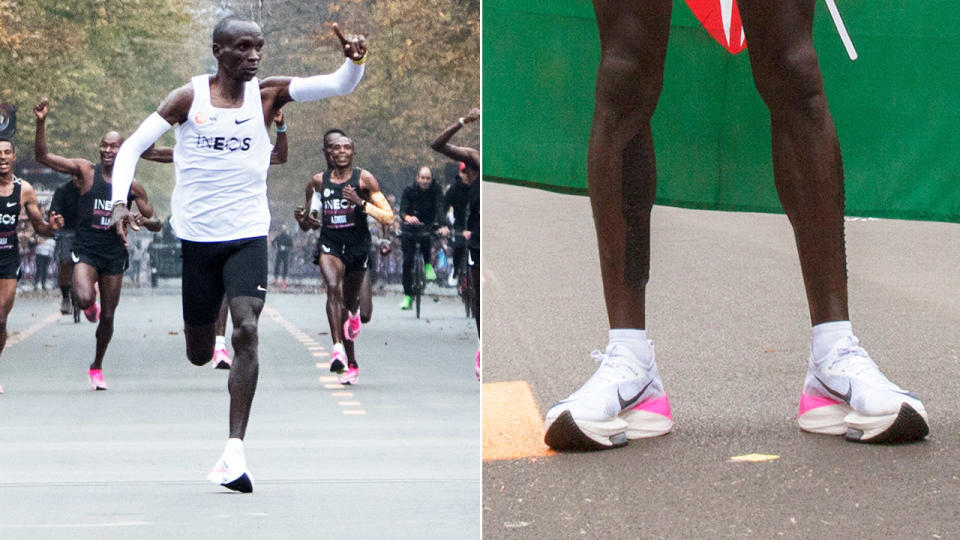Controversial Nikes set to be banned over marathon record furore
The controversial Nike shoes used in Eliud Kipchoge’s sub two-hour marathon are reportedly set to be banned.
The Kenyan runner stunned the sporting world last year when he became the first athlete to ever run a marathon in under two hours.
‘HORRIBLE NEWS’: WWE rocked by death of Rocky Johnson
The Olympic champion set a world-first time at the INEOS 1:59 challenge in Vienna, Austria, completing the 26.2 mile course in one hour, 59 minutes and 40 seconds.
"This shows no-one is limited," the 34-year-old said.
However the time wasn’t recorded as an official world record because of a number of controlled factors - including the Nike VaporFly shoes he was wearing.

Kipchoge wore the yet-to-be-commercially released shoes, featuring a much thicker sole than usual and carbon plates in the bottom.
And the shoes are now reportedly set to be banned.
World Athletics is said to about to introduce new rules to limit the thickness of soles and the use of carbon plates.
Current regulations also say shoes must be “reasonably available” to the general public and not provide an “unfair advantage”.
“When a shoe company puts multiple carbon plates in a shoe with cushion between the plates, it is no longer a shoe. It’s a spring and a clear mechanical advantage.” — Runner @ryanhall3 on Eliud Kipchoge’s unreleased Nikes for his sub 2 marathon. pic.twitter.com/qJ1y8VgFGx
— Darren Rovell (@darrenrovell) October 18, 2019
American star critical of shoes
Kipchoge’s use of the shoes opened up a heated debate about whether the hybrid shoe was akin to 'technological doping' and changed the sport of running into an arms race between sports-shoe manufacturers.
America’s half-marathon record holder Ryan Hall insists technological advances are creating an uneven playing field and some footwear could barely be classified as shoes anymore.
“With all due respect to Kipchoge, as he is clearly the greatest marathoner of all-time regardless of the shoes he is in, when a shoe company puts multiple carbon fibre plates in a shoe with cushion between the plates it is no longer a shoe, it’s a spring, and a clear mechanical advantage to anyone not in those shoes,” Hall wrote on Instagram.
“I’m just hoping the IAAF makes sure the upcoming Olympics and World Marathon Majors are fair playing fields for athletes of all brands.

“(But) shoes need to be regulated with strict rules so that it’s an even playing field for elite (runners) across all brands. I’m all about advances in technology that help us run faster.
“But I don’t think athletes should be losing races because they are in a shoe that doesn’t have a spring-like mechanism in them.
“This isn’t about unreleased prototypes not being available, it’s about mechanical advantage. Other sports have limits they place on the gear- cycling, triathlon, golf. So needs track and field.”
Fellow Kenyan Brigid Kosgei also wore the VaporFly shoes when she broke the women’s marathon world record in October.
Kosgei won the Chicago Marathon in 2 hours, 14 minutes and four seconds - a whopping 81 seconds faster than Paula Radcliffe’s 2003 record.

